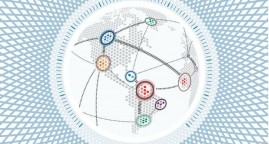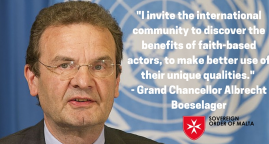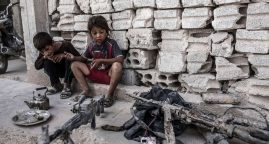ECHO budget almost doubles – but migration strings attached
A massive new cash aid project for refugees in Turkey marks a conspicuous leap in the EU humanitarian budget.
Welcome news, but has the impartiality of a major donor become a casualty of the refugee “crisis”?
The €348 million Emergency Social Safety Net (ESSN) project, announced last week, is the largest humanitarian grant ever made by the European Commission, which claims it is “a game changer in the delivery of international humanitarian aid”. Starting in October, one million refugees will begin to get monthly payments via a debit card to spend as they wish, whether on food, healthcare, housing, schooling, or other priorities. Instead of giving specific goods, humanitarian donors and aid agencies are increasingly embracing the benefits of providing cash stipends.
The European Commission’s emergency aid department, ECHO, has contracted the UN World Food Programme to implement the giant scheme “in partnership” with the Turkish Red Crescent and government bodies.
It comes as part of a €3 billion EU package of support to Turkey, announced in November 2015, to help the country host more than three million refugees and reduce the numbers of refugees and asylum seekers reaching Europe. The deal, already in difficulty, ties the hefty Facility for Refugees in Turkey aid package to Turkish cooperation in accepting asylum seekers returned from Greece and visa liberalisation for Turks visiting Europe.
The EU-Turkey deal is a political hot potato, and an internal memo written at the EU delegation to Turkey, obtained by IRIN, urges EC officials to work harder to show that the funds are moving. “Turkish authorities have been pointing [to] a lack of involvement, according to which no funds had been disbursed yet. Therefore it is urgent that the EU and its member states better communicate on the latest developments,” the memo says.
ECHO’s involvement can offer a quick and visible element to the EU’s aid package, and reduces the proportion of EU funds passing directly to the Turkish state, observers told IRIN. The rest of the €3 billion will go through other EC mechanisms to support Turkish health, education, infrastructure, and migration management services, and is largely at the planning stage: non-ECHO European aid channels have so far disbursed only €59 million.
Of the three billion total, ECHO was allocated €505 million to spend in 12 months, although projects can last longer than a year. Combined with a new €297 million funding stream to deliver aid within the EU’s borders, ECHO’s global allocation has increased by 86 percent since 2015 to €1.5 billion. All the new money is for Turkey and for Europe itself, while funds for the rest of the world remain about the same. To handle the “unprecedented budget”, ECHO told IRIN it has increased its staff in Turkey to 17, with more on the way.
Principle and precedent
While the needs of vulnerable refugees in Turkey are not in question, the unprecedented spending sits uneasily with ECHO’s positioning as an apolitical “needs-based” humanitarian donor, Brussels-based analysts told IRIN. In a written note to IRIN, ECHO rejected the doubts: “All EU humanitarian aid is impartial and independent, all over the world, be it in Turkey or elsewhere. We are providing humanitarian assistance to the most vulnerable amongst the refugees in Turkey, based on their needs and in line with the humanitarian principles.”
But it’s not so straightforward, according to some observers.
“Totally extraordinary,” said Kathrin Schick, director of VOICE, a network of European NGOs active in humanitarian aid. “The scale and nature of the Turkey portfolio for ECHO goes beyond the ‘harmonica system’ of expanding and contracting budgets that ECHO has become used to.”
There are many international NGOs in Turkey that have standing partnerships with ECHO, but their ability to operate is limited, their registration in Turkey short-term, and restrictions on visas and internal travel hampers their ability to work, Schick said.
“What does it do to ECHO?” the VOICE director asked, saying it could set a worrying precedent of ECHO being sucked into the union’s political priorities, not to mention wider issues of humanitarian principles and the EU’s role as a global actor.
She and other NGO analysts pointed out that the needs of unregistered refugees and asylum seekers, and their protection, should not be left out. And what about other nationalities? Only Syrian refugees may to be eligible for the safety net, according to a fact sheet: “Whilst the monthly cash-transfer under the ESSN will reach the most vulnerable families among registered Syrian refugees in Turkey, a referral system will be put in place as part of the ESSN to address the needs of other persons of concern too.”
Politics at play?
A senior European official, speaking on condition of anonymity, told IRIN that the Turkish ECHO spending was overdue, meeting genuine needs, and its underlying humanitarian goals were compelling: “we can’t sit back.. it’s regretful we had to wait for refugees swimming across the Aegean”. He said that other EC development aid typically flows “very slowly”. Asked whether this level of spending by ECHO in a single country could be called entirely needs-based, he responded that “other considerations” always come into play, politics “kicks in”, and that Turkey was a “special case”.
Sara Tesorieri, a policy advisor in Oxfam’s Brussels office, told IRIN she was “concerned about the political pressure ECHO may be under” to deliver part of a “quid pro quo” between the European Union and Turkey.
Known for being a “stand-out” among donors and other EC departments, ECHO’s principled stance has, if anything, led to a reputation for righteousness, she said. That independence had been used to good effect, with a focus, for example, on “forgotten conflicts” and filling gaps left by other donors. But Tesorieri said she believed the EU’s development and humanitarian budgets were under a “bigger onslaught” from the union’s political agenda than ever before and ECHO’s reputation for being “one of the most principled donors” could take a knock.
The EU is bringing its whole “toolbox” to the issue of migration, with a “proliferation of new instruments”, according to Tesorieri. Development budgets are no longer necessarily aimed at reducing poverty, but are being “instrumentalised” for migration control, in programmes such as the “Partnership Framework” with 16 countries whose citizens migrate to Europe, she argued.
Tesorieri pointed out that the close involvement of the Turkish government in the management of the safety net project was also unprecedented for ECHO. The Turkish government has “observer” status on a steering committee for the programme, while the Turkish Red Crescent and WFP have both emphasised the prominent role the government will take. In a statement welcoming the deal, WFP said: “We now look forward to growing our already excellent ties with the Prime Ministry Disaster and Emergency Management Presidency (AFAD) and the Ministry of Family and Social Policies.”
But ECHO played this down, telling IRIN: “EU humanitarian aid is never channelled through governments.”
“Is it needs-based? This is the eternal question… there is always an element of judgement”, the senior European official said.
Read the full article on IRIN website
Related Articles
The Global Risks Report 2016 is on line
01/14/2016. The Global Risks Report 2016 features perspectives from nearly 750 experts on the perceived impact and likelihood of 29 prevalent global risks.
Highlights of the Sovereign Order of Malta’s participation at the WHS
05/26/2015. 9000 participants came together to reshape the field of humanitarian action.
UN Security Council urges more protections for children in conflicts
10/31/2017. Mr. Guterres said children around the world are suffering “enormously and unacceptably,” resulting in “global shame.






